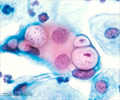A novel way to block the damaging effects of Chlamydia infections has been discovered by researchers at Duke University Medical Center.

A virulence factor that Chlamydia produces, called CPAF, emerged as a promising target to shut down because it plays an important role in protecting the bacteria within hiding places (vacuoles) in human cells. CPAF also prevents the human cell from committing suicide when it senses that it has been invaded by a pathogen (a common self-defense mechanism), giving Chlamydia bacteria an extended chance to multiply and stay hidden.
Microbiologists and genetics experts led by Raphael Valdivia, Ph.D., an associate professor in the Duke Department of Molecular Genetics and Microbiology, completed the work that narrowed down the search to an enzyme that Chlamydia produces, a protease called CPAF.
The Duke chemists, led by Dewey McCafferty, Ph.D., a professor in the Duke Departments of Chemistry and Biochemistry, designed a molecule that could block the CPAF activity inside of human cells.
They found that when CPAF was blocked over time by their designed molecule, the protective home that the bacteria make for themselves within the infected cells degraded, and CPAF no longer could degrade the proteins in the cell that would normally mount an immune response to the infection.
When CPAF is inhibited, the infected human cells effectively "commit suicide," Valdivia said.
Advertisement
The study has been published in the Cell Host and Microbe.











